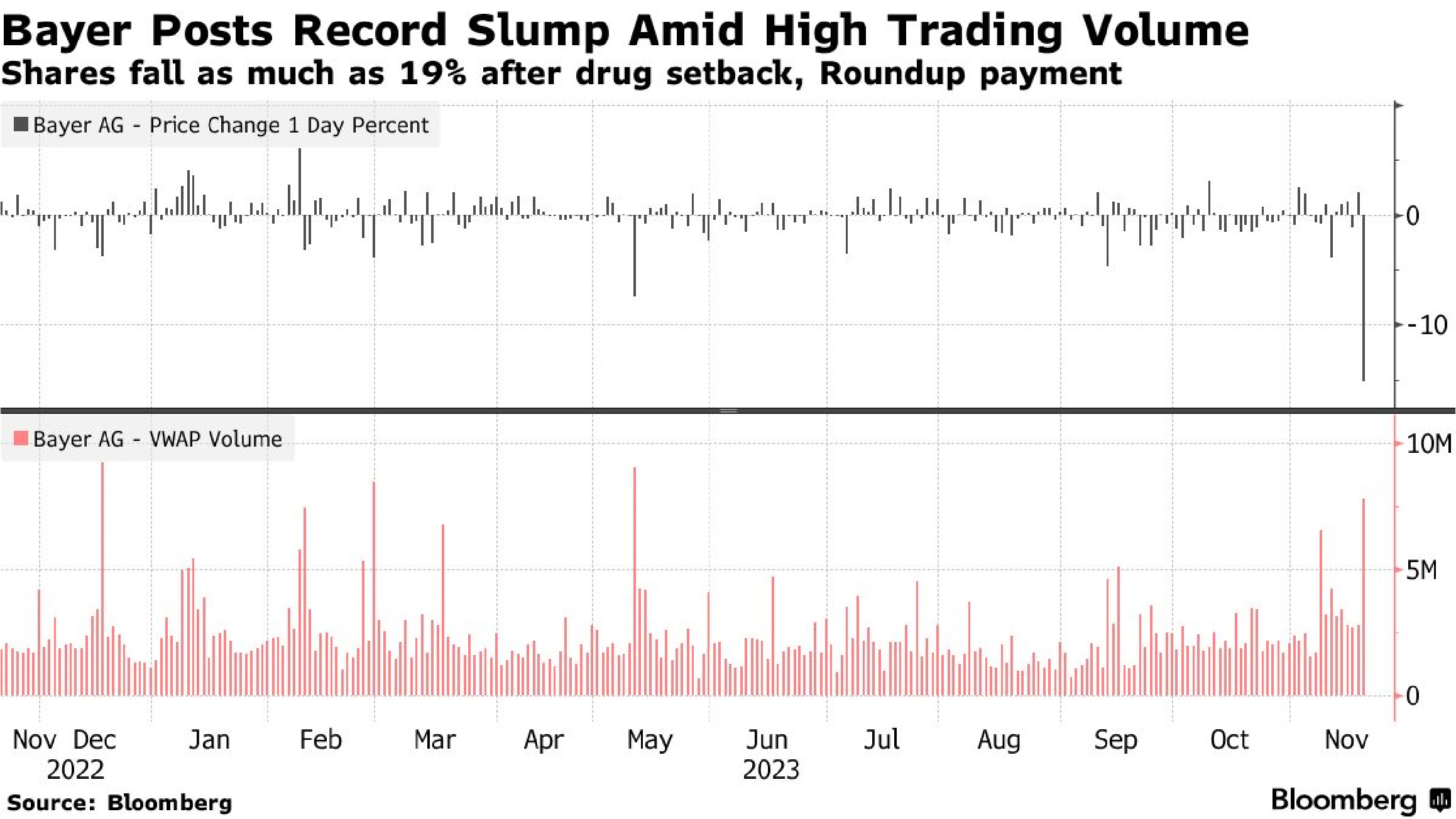Originally published on Bloomberg by Lyubov Pronina
November 20, 2023 at 6:05 AM CST
Few chemicals have caused as much controversy as Bayer AG’s popular Roundupweedkiller. Defenders say it’s helped to feed the world by transforming farm yields.Opponents contend that the product’s key ingredient glyphosate poses unacceptableenvironmental and health risks. When the European Union decided to renew its approvalfor glyphosate for another 10 years in November, member states were divided on the issueand new conditions were imposed on its use. Meanwhile, Bayer continues to fight courtcases against former Roundup users who say it caused their cancer.
1. What is glyphosate?
In use for almost five decades, glyphosate is present in hundreds of pesticides. Agricultureaccounts for the bulk of global demand, though home gardeners use it too. The chemical ismainly used to combat weeds but also helps crops dry and ripen. The dead weeds are nolonger available to insects and other small animals as a habitat and source of food, which
affects biodiversity. As usage has soared, traces of the chemical have been found in foodsincluding breakfast cereals and cookies, while residues have also been detected in water,soil, drinks and human urine. Glyphosate accounted for one-third of the total herbicidemarket in the EU in 2017, the most recent year available. Bayer insists the product is safe.
2. Why is it controversial?
Glyphosate was declared a probable human carcinogen in 2015 by the InternationalAgency for Research on Cancer, an arm of the World Health Organization. That prompted a flood of lawsuits, many targeting Bayer, which bought Roundup maker Monsanto Co. for$63 billion in 2018. However, the US Environmental Protection Agency has maintained since at least 2017 that glyphosate “is not likely” to be carcinogenic. The EuropeanChemicals Agency said again last year that classifying it as a carcinogen is not justified, and the European Food Safety Authority published a new review in July in which it said it found no “critical areas of concern” that would render the product unsafe for public use. Itsaid, however, that data gaps remain in such areas as consumer diets and aquatic plants,and that there is a “high long-term risk to mammals in 12 out of 23 proposed uses.”Presented with the conflicting conclusions, about two-thirds of respondents to an IPSOSpoll conducted in August said they thought glyphosate should be banned. The poll wasdone in Denmark, France, Germany, Poland, Romania and Spain on behalf of a consortiumof environmental activists, the Pesticide Action Network Europe.
3. Where do EU nations stand on the issue?
At a meeting of member states in October, neither supporters nor opponents achieved aqualified majority — which means at least 15 countries representing at least 65% of thebloc’s population. The same thing happened at the Appeal Committee in November,leaving it to the European Commission to make an executive decision. The EU’s biggesteconomy, Germany, abstained in the October and November votes, as did No. 2 France.Both have supported a glyphosate phaseout to protect biodiversity. Concerns have beenraised about the risk of the chemical drifting to adjacent areas, where it can harm otherplants and small herbivorous mammals.
4. What did the commission do?
On Nov. 16, the commission said it would proceed to renew the license, which expiresin mid-December, for another 10 years. New conditions include a prohibition on pre-harvest use as a desiccant, and measures to protect non-target organisms. European Commissioner for Health Stella Kyriakides told the European Parliament on Oct. 4 that there will be “permanent scrutiny.”
The Reference Shelf
- The European Commission’s 2023 renewal report for glyphosate, and a guide to how the bloc’s pesticide and herbicide approval process works.
- A 2017 Bloomberg Businessweek story examined the relationship between glyphosate and cancer.
- The European Food Safety Authority’s page on glyphosate.
- A report by the European Parliament’s
— With assistance from Tim Loh

Investors are hoping Anderson can navigate Bayer out of the thicket of challenges created by his predecessor, Werner Baumann, who orchestrated the Monsanto deal just weeks into11/27/23, 4:27 PM Bayer Slumps Most Ever After Roundup Verdict, Drug Setback – Bloomberg https://www.bloomberg.com/news/articles/2023-11-20/bayer-faces-fresh-blows-on-two-fronts-with-drug-setback-roundup?embedded-checkout=true 3/5
his own tenure. Baumann faced heavy criticism from the start for his decision to buy theagriculture company due to concerns about its reputational problems. Many investors wanted Bayer to use those funds to beef up its pharma division instead.
When Bayer Bought Monsanto, It Didn’t See This Lawyer Coming
Now, the full stakes of Baumann’s bet are becoming apparent. The pharma division isdealing with patent expirations for blockbuster medicines Xarelto, a blood thinner, andEylea, an eye medicine.
The German company said Sunday it had ended a late-stage test for the anti-thromboticdrug asundexian — a therapy billed as a potential blockbuster — due to a lack of efficacy.That’s raising questions about how Bayer’s pharma division will be able to generate growth in the years ahead.
“Asundexian was the pearl of Bayer’s pharma pipeline,” said Markus Manns, a portfoliomanager at Union Investment and a shareholder. Bayer should have found a partner to share development costs and risks with, he said, adding: “Just like with the Monsanto deal,Bayer decided for the much more risky strategy.”
Bristol-Myers Squibb Co., which is developing a similar drug called milvexian, fell as muchas 4.1% at the New York market open. Bristol’s treatment has fast-track designation from US regulators and is being developed in collaboration with Johnson & Johnson.
Bayer’s announcement came two days after its Monsanto unit was ordered by a Missourijury to pay more than $1.5 billion to three former Roundup users who blamed their cancerson the controversial product in one of its largest trial losses over the herbicide.
Monsanto has been hit with a recent spate of jury verdicts finding Roundup containscarcinogens. The more than $1.5 billion verdict is one of the largest damage awards handeddown against a US corporate defendant this year.
Bayer said it will appeal the verdicts and insists the product is safe. Two years ago, thecompany set aside as much as $16 billion to resolve more than 100,000 cases overRoundup’s health impact.
The conglomerate now faces a second wave of lawsuits. The legal risks could complicateAnderson’s efforts to spin offthe agriculture division, if he opts for that path, SebastianBray, an analyst with Berenberg, said in an email.
Bayer is currently in another Roundup trial before a state court jury in Philadelphiainvolving a man who blames the weed killer for his cancer. The jury is still hearingevidence and closing arguments in the case aren’t expected until later this month or inearly December, according to lawyers involved in the case.
Another case is scheduled to start in California in December, with at least three other casesslated to begin in Philadelphia in coming months.
What’s Bayer’s Roundup and Why Is It Controversial?: QuickTake
Aging Drugs
The experimental drug that failed, asundexian, was intended to help drive growth after current best-selling medicines Xarelto and Eylea lose their patent protections in coming years. An independent panel found the treatment underperformed the standard of care when itcame to preventing stroke and systemic embolism in patients with a form of abnormal heart rhythm called atrial fibrillation.
The indication represented about €4 billion of the estimated €5.5 billion in peak sales forthe drug, Thibault Boutherin and colleagues at Morgan Stanley said in a note Monday.They called the study decision “a meaningful negative.”
Bayer will continue another study with asundexian for preventing strokes, though themarket opportunity is smaller, the analysts noted. It will also need to decide whether tomove forward with a test in elderly patients, they said.
— With assistance from Jef Feeley, James Cone, Jan-Patrick Barnert, and Nacha Cattan

